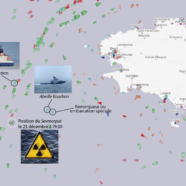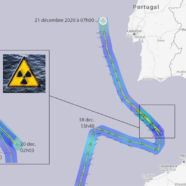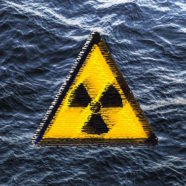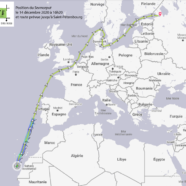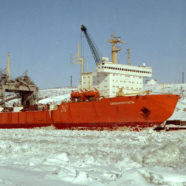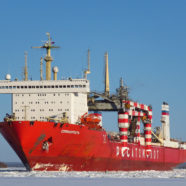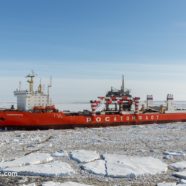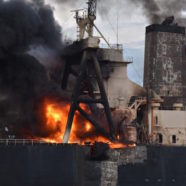New position of the Sevmorput
Press release n°7
Click on the map.
The Abeille Bourbon is the deep-sea tug chartered by the French Navy to cover the Bay of Biscay and the waters off Brittany.
The Polarstern is a German government research vessel, able to carry out sampling and analysis at sea of chemical or radioactive residues.
The other tugs or special craft are not yet identified.
SAVEmorput
14:00 (English version) – Press release n°6
On Friday, December 18, at 15:40, the atomic ship Sevmorput on her way to the European continent suddenly changes her course towards the Moroccan coast. The next day, Saturday 19th in the morning, she resumed her course northwards. But late this Saturday afternoon, she headed back again for the Moroccan coast. This uncertain path reflects the embarrassment of the Russian shipowner Rosatom and the failure of talks with Morocco, Spain and the United Kingdom (Gibraltar) likely to accomodate the ship in distress in a port or a place of refuge.
Technical and health problems on board the Sevmorput
2:00 pm – press release n°5
From 14 December 2020 at 16:00, when she was off Western Sahara, until yesterday at 22:00, the atomic ship Sevmorput followed an atypical path suggesting difficulties and delays on board. Yesterday, from 20:28 to 20:41, a helicopter from the Salvamento Maritimo sea rescue agency hovered over the ship. The commander of the Sevmorput, who reportedly showed symptoms of meningitis, is said to have been evacuated to the hospital in Las Palmas. There were 98 crew members and technicians on board the ship until then. After this evacuation, the Sevmorput resumed a linear path towards the European continent. In addition to the technical problems, there are now also health problems.
A disabled atomic ship is heading towards Europe
Press release n°4
English version: December 15, 2020
The last of the nuclear-powered cargo ships, the Russian Sevmorput, is in breakdown (see previous press releases*). On her way to Antarctica to unload heavy loads for the extension of the Vostok research station, the Sevmorput was forced to turn back. Victim of propeller or propeller shaft damage, she returns to St. Petersburg at reduced speed after having been wandering round and round for several weeks off the coast of Angola and Congo Brazzaville. Angola and South Africa were reportedly opposed to the Sevmorput‘s entry into their ports to carry out repairs in a shipyard.
Last minute. Sevmorput in breakdown off the coast of Africa
 11:40 am – Press release n°3
11:40 am – Press release n°3
Robin des Bois wrote yesterday to Rosatom, owner of the Sevmorput. Thanks to Rosatom for his reply:
Sevmorput in breakdown off the coast of Africa
 November 20, 2020 – Press release n°2
November 20, 2020 – Press release n°2
The arrival of the Russian nuclear-powered cargo ship was scheduled for early November at Progress station, in the north of the Antarctic continent.
For more than a month, the Sevmorput has been suffering a failure. She has been sailing at reduced speed to and from a small square in the South Atlantic Ocean off Angola and Congo Brazzaville.
According the social network Vkontakte spread by the Barents Observer, the breakdown of the only civilian nuclear-powered merchant ship still in operation does not affect the reactor compartment. The technical problems would come from the propeller shaft. Divers would be at work to carry out repairs, which could only be precarious.
An atomic merchant ship is zigzagging towards Antarctica
9:45 a.m.
Her arrival was scheduled for early November in a Russian logistic station along the Emperor and Adelie penguins’ territory. Even today, the Sevmorput is coming and going off Angola and Congo-Brazzaville. For several days, her erratic movements have been reported by the newspaper Barents Observer. The trajectory of the Sevmorput continues to be atypical. She could be confronted with technical problems or diplomatic polemics.
The Antarctic Treaty prohibits the dumping of nuclear waste. The last and only official use of nuclear power in Antarctica dates back to the 1960s and 1970s when a 1.8 megawatt nuclear power plant supplied electricity to the U.S. McMurdo science station.
Notices of oil spills on the world ocean
While the French Navy is sealing up cracks on the forepart of the Tanio wreck (1980) off Brittany, oil spills or oil spill risks are multiplying. The Covid-19 pandemic is involved in this resurgence. The crews are no longer relieved. Confined to their workplaces, they are overworked, cut off from the world and depressed. The Indian captain of the Wakashio, which ran aground on Mauritius, had been on board for a year and other crew members for 9 months. The minimal maintenance of merchant ships is also delayed. Political circumstances are other aggravating factors, as in the example of FSO (Floating Storage and Offloading) units which in peacetime “feed” tankers that have come empty from all over the world.





